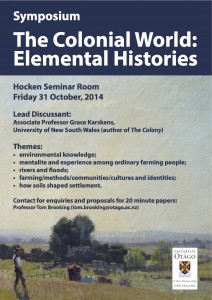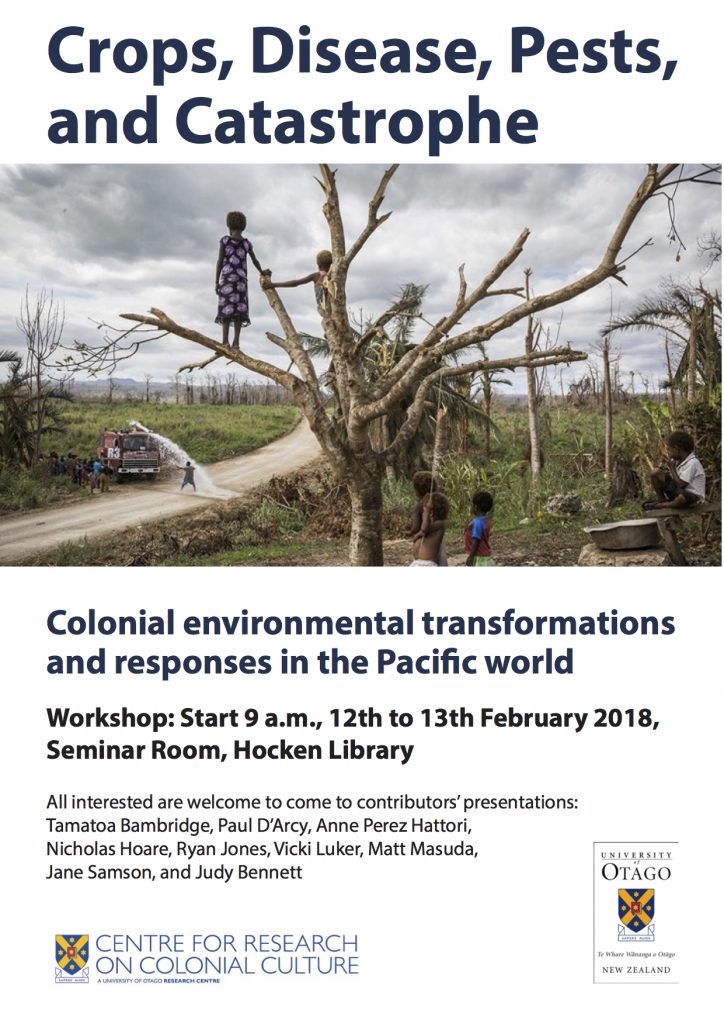Crops, Disease, Pests and Catastrophe
The Centre is pleased to be sponsoring an important workshop on new approaches to environmental history in the Pacific World. Co-convened by Centre member Judy Bennett and Paul D’Arcy (Australian National University), this two-day event takes place from 12-13 February at the Hocken Library Seminar room. It is free to attend and open to the public. If you are interested in attending please register with Judy Bennett [judy.bennett@otago.ac.nz]
CfP: New Histories of Pacific Whaling
Call for Papers
New Histories of Pacific Whaling
An International Symposium co-sponsored by the Rachel Carson Center, the University of Oregon and the Centre for Research on Colonial Culture, University of Otago, New Zealand
University of Hawai’i – Mānoa, June 29 – 30, 2018
Emerging historical scholarship is upending older work on whaling and showcasing it as an ideal medium with which to investigate human relationships with the oceans and with each other. Whales offer investigative bridgeheads into the cultural histories of non-human species, the hidden histories of energy economies, and the complicated histories of cross-cultural contact. Whale histories are demonstrating to environmental historians the various scales, including oceanic scales, with which they can work and are challenging them to consider new forms of evidence and new tools of interpretation. This international symposium aims to bring together the excellent, scholarship integrating the history of Pacific whaling with environmental and cross-cultural history. We seek participants from around the world to convene next year at Honolulu, the center of the Pacific whaling industry. We especially welcome scholarship that engages Pacific and environmental history and examines the crucial linkages between whaling, animal histories, indigenous histories, capitalism, diplomacy, environmental change, and globalization.
Participants will be expected to pre-circulate drafts of works in progress in advance of the symposium. Selected papers will be published as a special issue of Rachel Carson Center’s Perspectives. Travel and lodging costs will be covered by the seminar sponsors.
For those interested, please email 250-word paper proposals along with a short cv to the symposium conveners by September 1, 2017
Ryan Tucker Jones, University of Oregon rtj@uoregon.edu
Angela Wanhalla, University of Otago, angela.wanhalla@otago.ac.nz
Colonial Worlds Elemental Histories Symposium
A one-day elemental histories symposium, a Centre for Research on Colonial Culture event, was held on 31st October, at the Hocken Collections. ‘Colonial Worlds Elemental Histories’ began with a keynote address from Grace Karskens, Associate Professor, UNSW. Her stories of early settlers (1802-1830s) who farmed the fertile but flood-prone Castlereagh region west of Sydney, revealed dogged determination in the face of repeated devastation. The settlers developed a culture of risk-taking and opportunity that underlay their fatalistic attitude towards the Australian bush.
Professor Tom Brooking’s paper ‘Yeotopia Gained: New Zealand 1840-1914’ explained how by 1914 most farming in New Zealand was carried out by family concerns but on someone else’s land. The changes in land ownership revealed a fracturing of a flawed dream.
‘Elementally United: The Case of Canterbury’s Nor’west Wind’ by Katie Pickles exhorted us to think with our senses. The wind, a dominant force in shaping emotion is both felt and seen in the landscape.
Dr Michael Davis’s paper entitled ‘Entangled Knowledges: Indigenous and Environmental Histories across the Tasman’, featured the botanical explorations and friendships between New Zealander William Colenso, Australian Allan Cunningham and Englishman Joseph Dalton Hooker.
In ‘Getting to Know You: People and Rabbits in Southern New Zealand’, Emeritus Professor Peter Holland presented a collation of information culled from diaries and ledgerbooks of rural farms and stations. Across southern New Zealand rabbit densities varied with swings in weather and climate, and interactions between people and rabbits changed.
By contrast Dr Vaughan Wood examined a single but detailed diary for his paper ‘Mapping the network of a nineteenth century Canterbury farm.’ He was able to plot, trips to the store, post office, friends and relations. Asymmetric patterns of movement across farms were governed by swampy land. These farming men, he concluded were an integral part of community.
After lunch Dr Michael Roche gave us an exposition on ‘The Forest as an Elemental Natural Resource in Colonial New Zealand and the First Failure of Scientific State Forestry, 1874 to 1877.’ These three years saw the introduction of scientific forestry brought by Captain Campbell Walker, who had a career with the Indian Forest Service in Madras and had studied orthodox German practice.
Continuing with the forestry theme Dr André Brett provided us with ‘Forests and Provincial Abolition: Did Conservation Kill the Provinces?’ Forest conservation enjoyed prominent supporters in the political and scientific communities during the provincial era, but it failed to capture the public imagination.
Dr James Beattie’s paper ‘Expanding the Horizons of Chinese Environmental History: Cantonese gold-miners in colonial New Zealand, 1860s-1920s’, used the experiences Chinese working alluvial gold in Otago to explain how their traditional knowledge of water management techniques coupled with hard work and tenacity changed the landscape. One entrepreneurial family Choie Sew Hoy was particularly important in the dredging boom of the 1890s.
PhD Candidate Lucy Mackintosh shared her research on Auckland’s several park-scapes. Her paper ‘Shifting Grounds: Narratives of Identity in Auckland Landscapes’ examined the urban environment with its monuments. ‘Our parks’ she claims ‘so often valued for their natural features, are also rich repositories of stories about the past.’
Continuing the theme of public spaces, Dr Joanna Cobley’s paper ‘The Nineteenth Century Landscape: economics, heritage and national identity’ looked at the heritage site of Tongariro National Park. Gifted to the nation in 1887 this first National Park is still viewed within the frameworks of useful and beautiful.
In the final paper of the day Eric Pawson ‘Writing environmental history’ asked the delegates for their input on an article he was finishing for the International Encyclopedia of Geography.
At a small function also held at the Hocken the book James Beattie and Matthew Henry launched their book Climate, Science, and Colonization: Histories from Australia and New Zealand, by James Beattie, Matthew Henry and Emily O’Gorman (eds). Palgrave MacMillan, London, 2014. Emily O’Gorman was unable to attend the function.
Thanks to Rosi Crane for supplying this report.
Elemental Histories Programme
Colonial Worlds, Elemental Histories Symposium Programme,
Hocken Collections Seminar Room, Friday 31 October
To register email Tom Brooking (tom.brooking@otago.ac.nz)
9-10: Associate Professor Grace Karskens, University of New South Wales, ‘Colonial worlds, elemental histories.’
Session 1: 10-11.15
Professor Tom Brooking, University of Otago, “Yeotopia Gained: New Zealand 1840-1914’.
Associate Professor Katie Pickles, University of Canterbury, ‘Elementally United: The Case of Canterbury’s Nor’west Wind’.
Dr Michael Davis, Honorary Research Fellow, University of Sydney, ‘Entangled Knowledges: Indigenous and Environmental Histories across the Tasman’.
11.15-11.30: morning tea
Session 2: 11.30-12.20
Emeritus Professor Holland, University of Otago, ‘Getting to Know You: People and Rabbits in Southern New Zealand’.
Dr. Vaughan Wood, University of Canterbury, ‘Mapping the network of a nineteenth century Canterbury farm’.
12.20-1.20: Lunch
Session 3: 1.20-2.35
Professor Michael Roche, Massey University, ‘The Forest as an Elemental Natural Resource in Colonial New Zealand and the First Failure of Scientific State Forestry 1874 to 1877.’
Dr André Brett, University of Melbourne, ‘Forests and Provincial Abolition: Did Conservation Kill the Provinces?’.
Dr James Beattie, University of Waikato, ‘Expanding the Horizons of Chinese Environmental History: Cantonese gold-miners in colonial New Zealand, 1860s-1920s.’
2.35-3.00 afternoon tea
Session 4: 3.00-4.15
Lucy Mackintosh, PhD candidate, University of Auckland, ‘Shifting Grounds: Narratives of Identity in Auckland Landscapes’.
Dr. Joanna Cobley, University of Canterbury, ‘The Nineteenth Century Landscape: economics, heritage and national identity.’
Professor Eric Pawson, University of Canterbury, ‘Writing environmental history’.
4.15-5.00: Grace Karskens wrap up and general discussion
5.15: Book launch of James Beattie, Matthew Henry and Emily O’Gorman (eds)., Climate, Science, and Colonization: Histories from Australia and New Zealand, Palgrave MacMillan, London, 2014.
Elemental Histories
Professor Tom Brooking’s symposium ‘The Colonial World: Elemental Histories’, which will be held at the Hocken Collections on 31 October, has attracted a great line up of speakers. Featured on the programme are Associate Professor Grace Karskens (UNSW) who will open and close the day’s proceedings, and there will be presentations by James Beattie (Waikato), Mike Roche (Massey), Eric Pawson (Canterbury), Katie Pickles (Canterbury), Peter Holland (Otago), Rachael Egerton (Environment Southland), Lucy Mackintosh (Auckland), Tom Brooking (Otago), Andre Brett (Melbourne) and Michael Davis (Sydney). The symposium will end with the launch of James Beattie’s latest book, Climate, Science and Colonisation in Australasia (Palgrave Macmillan), co-edited with Emily O’Gorman and Matt Henry.
There is no cost to go this event but if you wish to attend this one-day symposium please register your interest with Prof. Tom Brooking (tom.brooking@otago.ac.nz). Further details about the programme will appear on this blog in October.
Environmental History Symposium
 Paper proposals are now being invited for an upcoming CRoCC event, an environmental history symposium at the Hocken Collections, University of Otago, Dunedin. It will be held on 31 October, and feature an address by Associate Professor Grace Karskens (University of New South Wales), author of The Colony.
Paper proposals are now being invited for an upcoming CRoCC event, an environmental history symposium at the Hocken Collections, University of Otago, Dunedin. It will be held on 31 October, and feature an address by Associate Professor Grace Karskens (University of New South Wales), author of The Colony.
If you are interested in presenting a paper or you want to attend the event please contact Professor Tom Brooking (tom.brooking@otago.ac.nz).


